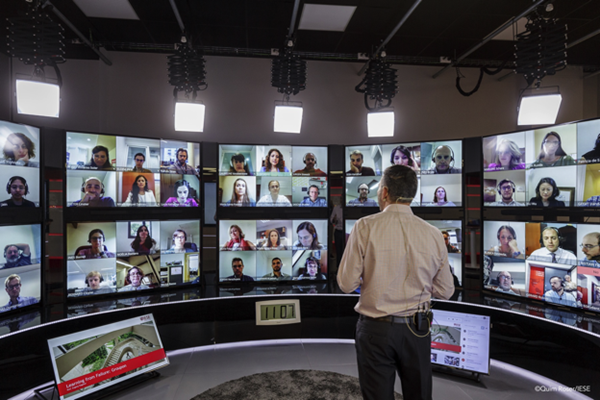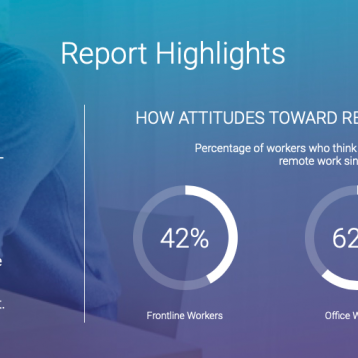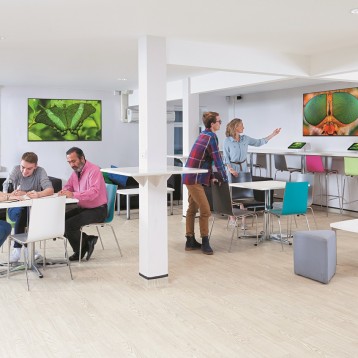Britain’s Weston College of further and higher education provides education and vocational training to nearly 30,000 learners across the country. As this includes school leavers, on-work apprentices, degree students, prisons and adult learners, they needed a remote learning solution that is flexible, engaging and focused on pedagogy. They recently implemented a 24-seat weConnect virtual classroom to meet these criteria.
Like most other institutions, Weston College found itself mobilising remote learning at the outbreak of Covid-19. The College rapidly recognised that they should ultimately seek out a longer-term solution that meets the requirements of a very broad audience. Dr Paul Phillips, CBE – Principal and Chief Executive was determined that the College advanced a solution.
Jonathan Hofgartner, the College’s Director for Technology, Learning Resources and Progression Skills, turned to Barco’s weConnect virtual classroom as a solution. He points to their desire to put the pedagogy “front and centre” in their remote learning solutions. “It’s not about the technology,” he says. “It’s around your intentions and planning for that lesson. [The technology] makes it easier in terms of giving them an experience that is as comparable as we can to a face-to-face session.” It was also important that the solution be engaging for all the different learners they cater for, many of whom are entirely remote.
Weston identified the in-class experience as important for everyone concerned. More specifically, a solution where the teacher can move around, express themselves and bring things into that space for the remote learners to see and connect with. They also wanted to help teachers to pick up on some of the non-verbal cues as well.
Jon commented: “When the teachers are looking at the students in front of them, how can we make that really visual so that they can maybe see if a student is trying to think something through or maybe doesn’t quite understand the description of something?”.
“Meaningful two-way engagement is essential to education and is a key aspect of weConnect,” says Jan van Houtte, General Manager Learning solutions at Barco. “Educational institutions worldwide are telling us that it provides a fundamental foundation for effective and distinguishing learning outcomes.”
Weston is already preparing for future digital delivery models with its partners at the West of England Institute of Technology. The virtual classroom will allow partners to share teaching across the region, on specialist areas. The College is also involved in finding the best way to attract and cater for, notably, adults returning to education. In many cases, they might be trying to get the education and retraining while working around family time or part-time work. “The weConnect virtual classroom will be part of that,” says Hofgartner. “There are applications in all areas of your curriculum where you could use this. Looking at it as a solution within further education, it also gives you that breadth to look at things like office space and employee engagement.”
- 97% of organisations are now using virtual classrooms to support learning and development, with over half (53%) reporting that they have proved to be their most successful learning platforms during the COVID-19 crisis.
This data is part of new research conducted by Fosway Group, Europe’s #1 HR industry analyst, in partnership with Barco, a global provider of networked visualisation solutions. It follows Fosway research earlier in 2020 which showed that 95% of learning leaders believe L&D has changed forever because of the pandemic.
Key findings from this new research include:
- A 5x increase in using virtual classrooms for high value programmes like leadership development since the start of COVID-19.
- An explosion in the use of virtual classrooms for coaching and mentoring, with a 19x increase.
- A 400% increase in the use of virtual classrooms for external training delivery.
- 95% of learners are satisfied with their virtual learning experiences.
- Group exercises, live collaboration and levels of interactivity are key influencers of success with virtual classrooms.
With the shift to remote working, the explosion in virtual classroom solutions was inevitable. But the research digs beyond initial crisis adoption to understand if these solutions are truly effective for learning, as well as having the capabilities required for high value people development. For example, the research shows that 70% of organisations are using Microsoft Teams as virtual classroom, but only 10% rate it as effective for learning. L&D leaders also state that creating a differentiated experience from normal virtual meetings is critical. Designing experiences that include high levels of interaction are necessary to make virtual learning work.
David Wilson, CEO of Fosway said: “Virtual classrooms have been a staple in corporate learning for a long time, but as with so many aspects of digital transformation, it’s taken the COVID-19 crisis to create a tipping point in their adoption. Early in the pandemic, there was a sense that any learning done was better than nothing. That meant it had to be virtual or digital. But as time goes on, organisations must go beyond lowest common denominator solutions and have to also deliver against strategic people initiatives such as leadership and team development.”
He continues, “Given the ongoing need for extended home working and limited business travel, all companies need to maximise the untapped potential that virtual classrooms can provide. It’s

not enough to just lift and shift face-to-face sessions into a virtual environment. It’s critical to design the experiences and harness the full collaborative and interactive capabilities that some of the solutions on the market have to offer.”
Ellen Van de Woestijne, Marketing Director of Barco said: “Supporting organisations through the COVID-19 crisis has been our number one concern and understanding how learning priorities and business challenges are evolving now is key to that. It is clear that many L&D teams won’t simply be reverting back to the old face-to-face model even after the pandemic is over. So, we are delighted to collaborate with Fosway on this research and hopefully highlight key areas of importance and opportunity into 2021.”
This research was carried out between August and October 2020, with initial results based on input from 136 enterprise organisations.
Weston College found itself mobilising remote learning at the outbreak of Covid-19.






